#War-Crimes Investigator
Text
The Secret Life and Anonymous Death of the Most Prolific War-Crimes Investigator in History
When Mustafa Died, in the Earthquakes in Türkiye, his Work in Syria had Assisted in the Prosecutions of Numerous Figures in Bashar al-Assad’s Regime.
— By Ben Taub | September 14, 2023

Photo Illustration By Cristiana Couceiro; Source Photograph From Getty Images
It Was 4:17 A.M. on February 6th in Antakya, an Ancient Turkish City Near the Syrian Border, when the earth tore open and people’s beds began to shake. On the third floor of an apartment in the Ekinci neighborhood, Anwar Saadeddin, a former brigadier general in the Syrian Army, awoke to the sounds of glass breaking, cupboard doors banging, and jars of tahini and cured eggplant spilling onto the floor. He climbed out of bed, but, for almost thirty seconds, he was unable to keep his footing; the building was moving side to side. When the earthquake subsided, he tried to call his daughter Rula, who lived down the road, but the cellular network was down.
Thirty seconds after the first quake, the building started moving again, this time up and down, with such violence that an exterior wall sheared open, and rain started pouring in. The noise was tremendous—concrete splitting, rebar bending, plates shattering, neighbors screaming. When the shaking stopped, about a minute later, Saadeddin, who is in his late sixties, and his wife walked down three flights of stairs, dressed in pajamas and sandals, and went out into the cold.
“All of Antakya was black—there was no electricity anywhere,” Saadeddin recalled. Thousands of the city’s buildings had collapsed. Survivors spilled into the streets, crowding rubble-strewn alleyways and searching for open ground, as minarets toppled and glass shards fluttered down from tower blocks. The general and his wife set off in the direction of the building where Rula lived, with her husband, Mustafa, and their four children.
A third quake shook the ground. When Saadeddin made it to his daughter’s apartment block, flashes of lighting illuminated what was now a fourteen-story grave. The building—which had been completed less than two years earlier—had twisted as it toppled over, crushing many of the residents. Saadeddin felt his body drained of all emotion, almost as if it didn’t belong to him.
Saadeddin was not the only person searching for Rula and her family. For the past decade, her husband, Mustafa, had quietly served as the deputy chief of Syria investigations for the Commission for International Justice and Accountability, a group that has captured more than a million pages of documents from Syrian military and intelligence facilities. Using these files, lawyers at the cija have prepared some of the most comprehensive war-crimes cases since the Nuremberg trials, targeting senior Syrian regime officers—including the President, Bashar al-Assad. After the earthquake, the group directed its investigative focus into a search-and-rescue operation for members of its own Syrian team, many of whom had been displaced to southern Turkey after more than a decade of war. By the end of the third day, nearly everyone was accounted for. Two investigators had lost children; one of them had also lost his wife. But Mustafa was still missing.
For as long as Mustafa had been working for the cija, the group had kept his identity secret—even after it captured a Syrian intelligence document that showed that the regime knew about his investigative work and was actively hunting him down. “He was probably my best investigator,” Mustafa’s supervisor, an Australian who goes by Mick, told me, during a recent visit to the Turkish-Syrian border. Documents that Mustafa obtained, and witness interviews that he conducted, have assisted judicial proceedings in the United States, France, Belgium, Germany, and several other European jurisdictions. According to a cija estimate, Mustafa “either directly obtained or supported in the acquisition” of more than two hundred thousand pages of internal Syrian regime documents, likely making him—by sheer volume of evidence collected—the most prolific war-crimes investigator in history.
Twelve years into the Syrian war, at least half the population has been displaced, often multiple times, under varied circumstances of individual tragedy. No one knows the actual death toll—not even to the nearest hundred thousand. And yet the Syrian regime’s crimes continue apace. “The prisons are full,” Bill Wiley, the cija’s founder and executive director, told me. “All the offenses that started being carried out at scale in 2011 are still being perpetrated. Unlawful detention, physical abuse amounting to torture, extrajudicial killing, sexual offenses—all of that continues. War crimes on the battlefield, particularly in the context of aerial operations. There are still chemical attacks. It all continues. But, as long as there’s the drip, drip, drip of Western prosecutions, pursuant to universal jurisdiction, it’s really difficult to envision the normalization of the regime.”
Before the Syrian Revolution, Mustafa was a trial lawyer, living and working in Al-Rastan, a suburb of the central city of Homs. He and his wife, Rula, had three small children, and Rula was pregnant with the fourth. In early 2011, when Syrians took to the streets to protest against the regime—which had ruled for almost half a century—Assad declared that anyone who did not contribute to “burying sedition” was “a part of it.” Suddenly Mustafa was caught in a delicate position, since many of Rula’s male relatives were military officers.
Her father and her uncles had joined the Syrian armed forces as young men, and served Assad’s father for many years before they served him. In the mid-nineties, Assad’s older brother died in a car crash, and he was called back from his studies in London and sent to a military academy in Homs. Eventually, he joined a staff officers’ course, where Anwar Saadeddin—then a colonel and a military engineer—says he spent a year and a half in his class.
Assad became President in 2000, after his father died, and for the next decade Saadeddin carried on with his duties without complaint. In 2003, Saadeddin was promoted to the rank of brigadier general. At the outset of the revolution, his younger son was a lieutenant, and he was two years from retirement.
Mustafa and Rula’s fourth child was born on April 5, 2011. Three days later, security forces shot a number of protesters in the Baba Amr neighborhood of Homs, including a disabled man, who was unable to run away. They dragged him from the site and returned his mutilated corpse to his family the following evening. From then on, Homs was the site of some of the largest anti-regime protests—and the most violent crackdown.
On April 19th, thousands of people gathered for a sit-in beneath a clock tower. At about midnight, officers warned that anyone who didn’t leave voluntarily would be removed by force. A couple of hours passed; a thousand people remained. At dawn, the people of Homs awoke to traces of a massacre. A witness later reported that religious leaders who had stayed to treat the wounded and to tend to the dead were summarily executed. Several others recalled that the bodies were removed with dump trucks, and that the blood of the dead and wounded was washed away with hoses.
The day after the massacre, according to documents that were later captured from Assad’s highest-level security committee, the regime decided to embark on a “new phase” in the crackdown, to “demonstrate the power and capacity of the state.” Nine days later, regime forces killed at least nineteen protesters in Al-Rastan, where Mustafa and Rula lived. Mustafa wasn’t involved in politics or human-rights work, beyond discussions of basic democratic reforms, but he was appalled by the overtly criminal manner in which security forces and associated militias carried out their campaign with impunity. Locals formed neighborhood-protection units, and soon took up arms against the state.
A few months later, Mustafa briefly sneaked out of Syria to attend a training session in Turkey, led by Bill Wiley, a Canadian war-crimes investigator who had previously worked for various tribunals and the International Criminal Court. Wiley, and others in his world, had noticed a jurisdictional gap in accountability for Syria and had begun casting about for Syrian lawyers who might be up for a perilous, but worthy, task. Although there was no tribunal set up for Syria, and Russia and China had blocked efforts to refer Syria to the I.C.C., Wiley and his associates had reasoned that the process of collecting evidence is purely a matter of risk tolerance and logistics. The work of criminal investigators is different from that of human-rights N.G.O.s: groups like Amnesty International and Human Rights Watch produce and disseminate reports on horrific violations and abuse, but Wiley trained Mustafa and the other Syrians in attendance to collect the kind of evidence that could allow prosecutors to assign individual criminal responsibility to senior military and intelligence officers. A video showing tanks firing on unarmed protesters might influence public opinion, but a pile of military communications that proved which commanders were in charge of the operation could one day land someone in jail.
“The first task was to ferret out primary-source material—documents, in particular, generated by the regime,” Wiley told me. “We were looking for prima-facie evidence, not intelligence product or information to inform the public.”
Mustafa instantly grasped the urgency of the project. By day, he carried on with his law practice. But, in secret, he started building up sources within the armed opposition. As they captured new territory, he would go into security and intelligence facilities, box up documents, and move them to secret locations, like farmhouses or caves, farther from the confrontation lines.
“By 2012, we had already started to get some structure,” Wiley recalled. He secured funding from Western governments, and eventually the group settled on a name: the Commission for International Justice and Accountability. “We had our guys in Raqqa, Idlib, Aleppo, and so forth—at least one guy in all the key areas,” he said. From there, the cija built out each team—between two and four individuals, working under the head of each provincial cell. “And Mustafa was our core guy in Homs.”
Anwar Saadeddin soon found himself wielding his position in order to rescue relatives who were caught up in the conflict. His younger son, an Army lieutenant, was detained by military operatives on the outskirts of Damascus, after another officer in his brigade reported him for watching Al Arabiya and Al Jazeera. According to an internal military communication, which was later captured by the cija, Assad believed that foreign reporting on Syria amounted to “psychological warfare aimed at creating a state of internal chaos.”
When Saadeddin’s son was detained, he recalled, “I interfered just to decrease the detention period to thirty days.” Soon afterward, he learned that Mustafa was a target of military intelligence in Homs, where the local facility, Branch 261, was headed by one of Saadeddin’s friends: Mohammed Zamrini.
Mustafa wasn’t calling for an armed rebellion, and, at the time, neither the regime nor his father-in-law knew of his connection to Wiley and the cija. But rebel factions were active in Al-Rastan, and Mustafa was known to have urged them not to destroy any public establishments. To hard-liners in the regime, such interaction was considered tantamount to collaboration. “So I went with Mustafa to the branch,” Saadeddin told me. Zamrini agreed to detain him as a formality—for about twelve hours, with light interrogations and no torture or abuse—so that he could essentially cross Mustafa off the list.
In the next few months, the security situation rapidly deteriorated. The Army encircled rebellious neighborhoods near Homs and shelled them to the ground. Saadeddin’s son, who was serving near Damascus, was arrested a second time, and in order to get him released Saadeddin had to supplicate himself in the office of Assef Shawkat, Assad’s brother-in-law and the deputy minister of defense. In Homs, Saadeddin started driving Mustafa to and from work in his light-blue Kia; as a brigadier general, he could move passengers through checkpoints without them being searched or arrested.
But Saadeddin was beginning to find his position untenable. He sensed that the regime’s policy of total violence would lead to the destruction of the country. That spring, he began to share his fears and frustrations with close colleagues and friends, including the commander of his son’s brigade. But it was a perilous game: Assad’s highest-level security committee had instructed the heads of regional security branches to hunt down “security agents who are irresolute or unenthusiastic” in carrying out their duties. According to a U.N. inquiry, some officers were detained and tortured for having “attempted to spare civilians” on whom they had been ordered to fire.
That spring, Saadeddin’s car was stopped at one of the checkpoints that ordinarily waved him through. It was the first time that his position served not as protection against interrogation but as a reason to question his loyalty. The regime was quickly losing territory, and as the conflict spiralled out of control many senior officers found themselves approaching the limits of their willingness to go along. He and his brothers had “reached a point where we would either stand by the regime and have to take part in atrocities, or we would have to defect,” he told me.
That July, Saadeddin gathered his brothers, his sons, two nephews, and several other military officers in front of a small camera, somewhere near the Turkish-Syrian border. Dressed in his uniform, he announced that the army to which he had pledged his allegiance some four decades earlier had “deviated from its mission” and turned on its citizens instead. To honor the Syrian public’s “steadfastness in the face of barbaric assaults by Assad’s bloody gangs, we have decided to defect from the Army,” he said. It was one of the largest mass defections of Syrian officers, and his plan was to take a leading role in the rebellion—to fight for freedom “until martyrdom or victory.” In response, Saadeddin told me, their former colleagues sent troops to destroy their houses and those of their family members. They expropriated their land and killed several of their relatives.
By now, the regime had ceded swaths of Syria’s border with Turkey to various rebel forces. Saadeddin moved his family across the border and into a refugee camp that the Turkish government had set up for military and intelligence officers who defected. Then he went back to Syria, to try to bring some order and unity to the rebel factions that were battling his former colleagues.
But Mustafa and his family stayed behind in Al-Rastan, which was now firmly in rebel hands. The regime’s loss of control at the Turkish border meant that the cija could start moving its captured documents out of the country.
“It was complicated, reaching the border, because the confrontation lines were so fluid,” Wiley recalled. “And there were multiple bodies who were overtly hostile to cija”—not only the regime but also a growing number of extremist groups who were suspicious of anyone working for a Western N.G.O. During the first document extraction, a courier was shot and injured. During the next, another courier vanished with a suitcase full of documents. “Just fucking disappeared,” Wiley said. “Probably thought he could sell them.” Mustafa recruited a cousin to transport some files to Turkey. But, after the delivery, on the way back to Al-Rastan, the cousin took a minibus, and the vehicle was ambushed by regime troops. “He was shot, but it was unclear if he was wounded or dead when they took him away,” another Syrian cija investigator, whom I’ll call Omar, told me. For the next several weeks, regime agents blackmailed Mustafa, saying that for twenty thousand dollars they would release his cousin from custody. But, when Mustafa asked for proof of life, they failed to provide it—suggesting that the cousin had already died in custody.
By now, Wiley had issued new orders for the extraction process. “I said, ‘O.K., there needs to be a plan, and I need to know what the plan is,’ ” he recalled. “ ‘How are you getting from A to B? What risks are there between point A and point B? And how are you going to ameliorate those risks?’ As opposed to just throwing the shit in the car and going, ‘Well, God decides.’ ”
Saadeddin Spent Much of the next eighteen months trying to organize disparate rebel groups into a unified command. He travelled all over northern Syria, as rebels took new ground, and met with all manner of revolutionaries—from secular defectors to hard-line field commanders. By the summer of 2013, the regime had ceded control of most of northern Syria. But there was little cohesion between the rebel factions, and isis and Al Qaeda had come to exploit the power vacuum in rebel territory. At some point, Saadeddin recalled, he scolded a Tunisian isis commander for arousing sectarian and ethnic tensions, and imposing extremism onto local communities. “He responded that I was an apostate, and suggested that I should be killed,” Saadeddin told me.
In Al-Rastan, a regime shell penetrated the walls of Mustafa’s house, but it didn’t explode. At that point, Rula and the children moved to Reyhanli, a small Turkish village that is so close to the border that you can eat at a kebab shop there while watching sheep graze in Syria. It was also a short drive from the defected officers’ camp, where Rula’s mother and several other relatives were living. But Mustafa stayed behind, to carry out his investigative work for the cija.
“When new areas were liberated, the security branches were raided, and many people took files,” Omar recalled. Some of them didn’t grasp the significance of the files; at least one soldier burned them for warmth. “But most people knew the documents would be useful, someday—they just didn’t know what to do with them. So they just kept them. And the challenge was in identifying who had what, where.”
But, before long, Omar continued, “Mustafa built a wide network of contacts in rebel territory. Word got out that he was collecting documents, and so eventually people would refer others who had taken documents to him.” Sometimes he encountered a reluctance to turn over the originals, until he shared with them the outlines of the cija’s objective and paths to accountability. “At that point, they would usually relent, understanding that his use for them was the best use.”
As his profile in rebel territory grew, Mustafa remained highly secretive. But, from time to time, he asked his father-in-law for introductions to other defected military and intelligence officers. By now, Saadeddin recalled, “I knew the nature of his work, but I didn’t discuss it with him.” There was an understanding that it was best to compartmentalize any sensitive information, for the sake of the family. “Sometimes my wife didn’t even know what I was doing,” Saadeddin said. “But I do know that, at a certain point, through his interviews, Mustafa came to know these defected officers even better than I did.”
In 2014, Wiley restructured the cija’s Syrian team; as deputy chief of investigations, Mustafa now presided over all the group’s provincial cells. “He was very good at finding documents, and he understood evidence and law,” Wiley said. “But he was also respected by his peers. And he had a natural empathy, which translated into him being a very good interviewer” of victims and perpetrators alike. According to Omar, Mustafa often cut short his appearances at social gatherings, citing family or work. “I know it’s a cliché, but he really was a family guy,” Wiley told me. “But where he excelled in our view—because we don’t need a bunch of good family guys, to be blunt—is that he could execute.”
That July, Assad’s General Intelligence Directorate apparently learned of the cija’s activities, long before the group had been named in the press. In a document that was sent to at least ten intelligence branches—and which was later captured by the cija—the directorate identified Mustafa as “vice-chairman” of the group, and also listed the names of the leading investigators within each of the cija’s governorate cells. At the bottom of the document, the head of the directorate handwrote orders to “arrest them along with their collaborators.”
By now, Western governments, which had pledged to support secular opposition groups, found the situation in northern Syria unpalatable; there was no way to guarantee that weapons given to a secular armed faction would not end up in jihadi hands. Saadeddin had begun to lose hope in the revolution—a sentiment that grew only stronger when Assad’s forces killed more than a thousand civilians with sarin gas, and the Obama Administration backed away from its “red-line” warning of retaliation. “At that point, I lost all faith in the international community,” Saadeddin told me. “I felt that they didn’t want Syria to become liberated—they wanted Syria to stay as it was.” He moved into the defected officers’ camp in southern Turkey, where he remained—feeling “rotten,” consumed by a sense of impotence and frustration—for most of the next decade.
I First Came Into Contact with the cija late in the summer of 2015. By that point, the group had smuggled more than six hundred thousand documents out of Syria, and had prepared a legal brief that assigned individual criminal responsibility for the torture and murder of thousands of people in detention centers to senior members of the Syrian security-intelligence apparatus—including Assad himself. In the following years, the cija expanded its operations to Iraq, Myanmar, Libya, and Ukraine. But Syria was always at the core.
“In terms of the opposition overrunning regime territory—that effectively ceased in September, 2015, when the Russians came in,” Wiley recalled. In the following years, Russian fighter jets pummelled areas under rebel control, while fighters from Russian mercenary groups, Iranian militias, and Hezbollah reinforced Assad’s troops on the ground. In time, the confrontation lines settled, with the country effectively carved into areas under regime, opposition, Turkish, and Kurdish control. But Mustafa and other investigators continued to identify troves of documents, scattered among various hidden sites. “We’d acquire them from different places, and then concentrate them,” Wiley said. Omar told me that it was best to keep files as close to the border as possible, to limit the chance of their being destroyed in the event that the regime took back ground. “Mustafa would sometimes spend a week or more prepping for document extractions,” Omar said. “He would sleep in tents,” in camps filled with other displaced civilians, “while he waited for the right moment to move the files closer to the border.”
At the cija’s headquarters, in Western Europe, the organization built cases against senior intelligence officers, like the double agent Khaled al-Halabi, and provided evidence to European prosecutors who were investigating lesser targets all over the continent. In recent years, Western prosecutors and police agencies have sent hundreds of requests for investigative assistance to the cija headquarters; when the answers can’t be found in the existing files, analysts refer the inquiries, via Mick, the Australian in southern Turkey, to the Syrians on the ground. “We wouldn’t tell them who’s asking, or who the suspects are,” Wiley said. “We’d just say, ‘O.K., we’re interested in witnesses to a particular crime base’—a security-intelligence facility, a static killing, an execution, that kind of thing. And then they would identify witnesses and do a screening interview.” When requests came through, Mick told me, “Mustafa was usually the first team member that I went to, because his networks were so good.”
During the peak years of the pandemic, Mustafa identified and collected witness statements against a trio of Syrian isis members who had been active in a remote village in the deserts of central Syria and were now scattered across Western Europe. All three men were arrested after his death.
Perhaps Mustafa’s most enduring contribution to the cija’s casework is found in one of the group’s most comprehensive, confidential investigative briefs, which I read at the headquarters this spring. It’s a three-hundred-page document, with almost thirteen hundred footnotes, establishing individual criminal responsibility for war crimes carried out during the regime’s 2012 siege of Baba Amr, a neighborhood in the southern part of Mustafa’s home city, Homs. Other cases have centered on torture in detention facilities; this is the first Syrian war-crimes brief that focusses on the conduct of hostilities, and it spells out, in astonishing and historic detail, a litany of crimes, ranging from indiscriminate shelling to mass executions of civilians who were rounded up and killed in warehouses and factories as regime forces swept through. The Homs Brief—for which Mustafa collected much of the underlying evidence—also assigns criminal responsibility to individual commanders within the Syrian Army’s 18th Tank Division, which carried out the assault.
“He thought he was contributing to a better Syria,” Wiley said. “When—and what it would look like—was unsure. But he believed in what he was doing. He could have fucked off years ago. We probably could have gotten him to Canada. We talked about it, because one of his daughters had a congenital heart issue.” Nevertheless, he stayed.
Last year, Mustafa bought an apartment on the eleventh floor of a new tower block in Antakya. Rula’s aunt moved into the same building, a couple of stories below. Her parents left the defected officers’ camp and moved into another apartment block, a short walk up the road. A few months later, Mick recalled, “Mustafa said to me, ‘When I’m at home with my family, it doesn’t matter what’s happening outside—it doesn’t matter if there’s a war. When I’m at home, I’m at peace.’ ”
Last December, Mick was visiting Mustafa’s apartment when the floor began to shake. “It spooked me—it was my first time feeling this kind of tremor,” Mick recalled. Mustafa laughed and said that they happen “all the time.” Then he went to check on Rula and the children, who reported that they hadn’t even felt it.
A couple of months later, Mick awoke to news of the catastrophic earthquake and tried to call members of his Syrian team. But the cellular networks were down in Antakya, and it was impossible for him to travel there, because the local airport’s runway had buckled, along with many local roads.
Saadeddin’s sister was dug out of the complex alive; her husband survived as well, but died in a hospital soon afterward, without anyone in the family knowing where he was. On the fourth day of search-and-rescue operations, Mustafa’s passport was found in the rubble. Then his laptop, then his wife’s handbag. “When they found the bodies,” Omar said, “Mustafa was hugging his daughter, his wife was hugging their son, and the other two children were hugging each other.”
Omar spent the next several days sleeping in his car, along with his wife and six children. Thousands of aftershocks shook the region, and, by the time I met with him, a few hundred metres from the Syrian border, he was so rattled that he reacted to everyday sounds as if they might signal a building’s collapse. His breath was short and his eyes welled with tears; Mustafa had been one of his best friends, and he had also lost eleven relatives to the quake, all of whom had been displaced from the same village in northern Syria. Then his young son walked into the room, and he turned his head. “We try to hide from our children our fear and our grief, so that they don’t feel as if we are weak,” he said.
A few weeks after the earthquake, there was an empty seat at a prestigious international-criminal-investigations course, in the Hague. Mustafa had been scheduled to attend. “We can mitigate the effects of war, except bad luck, but we didn’t factor an earthquake into the plan, institutionally,” Wiley told me. Mick coördinated humanitarian assistance for displaced investigators, and, as Wiley put it, “the operational posture came back really quickly.” Omar has now taken over Mustafa’s leadership duties. “Keep in mind how resilient this cadre is,” Wiley continued. “They’re already all refugees, perhaps with the rare exception. They had already lost their homes, lost all their stuff.”
It was the middle of April, more than two months after the quake. Much of Antakya had been completely flattened, and what still stood was cracked and broken, completely abandoned, and poised to collapse. Mick and I made our way through the old city on foot; the alleys were too narrow for digging equipment to go through, and so we found ourselves climbing over rubble, as if the buildings had fallen the day before. The pets of those entombed in the collapsed buildings followed us, still wearing their collars—bewildered, brand-new strays. ♦
#Syria 🇸🇾 | Earthquakes | Türkiye 🇹🇷 | War Crimes#President Bashar al-Assad#War-Crimes Investigator#Secret Life#Anonymous Death#History#Ben Taub#The New Yorker#Mustafa | Trial Lawyer
2 notes
·
View notes
Text
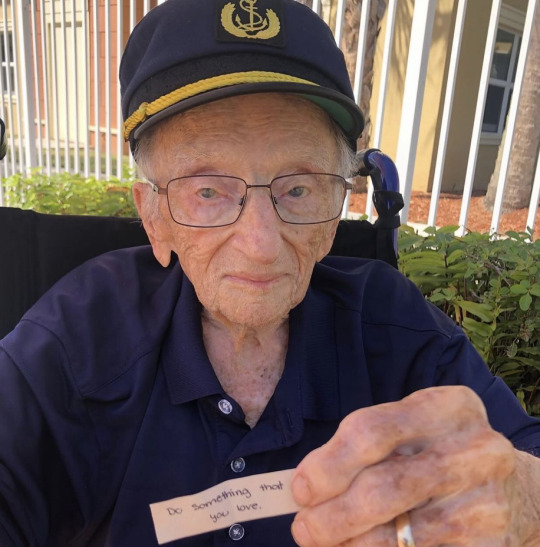
Benjamin Ferencz was born on March 11, 1920, to a Jewish family in the Carpathian Mountains of Transylvania. He was only 10 months old when his family moved to the United States and settled in the Lower East Side. In 1943, Ferencz graduated from Harvard Law School and enlisted in the U.S. Army as America was preparing to invade France. He served under General Patton and was awarded 5 battle stars.
Towards the end of WWII, Ferencz was appointed as a war crimes investigator in the newly established War Crimes Branch of the U.S. Army. He gathered proof of Nazi brutality to convict individuals of international war crimes. Ferencz was a first-hand witness of the atrocities committed by the Nazis and was among the U.S. forces that liberated several concentration camps.
When asked about what he had witnessed, Ferencz said, “My mind would not accept what my eyes saw. … I had peered into hell.”
By the end of 1945, Ferencz returned to New York and was soon recruited by the U.S. Government to join the team for the Nuremberg Trials. At just 27 years old, Ferencz was appointed Chief Prosecutor in the Einsatzgruppen Trial, which is considered the biggest murder trial in history. Ferencz and his team were responsible for the convictions of 22 Nazi death squad commanders, guilty of genocidal war crimes and crimes against humanity and were charged with the murder of over one million people.
Here is a photo from this time last year on his 103rd birthday, reminding us to “do something that you love.”
Ferencz passed away just a few weeks later on April 7, 2023. May his memory be a blessing.
humansofjudaism
86 notes
·
View notes
Text
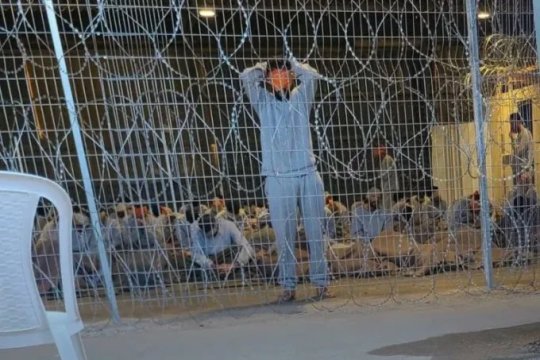
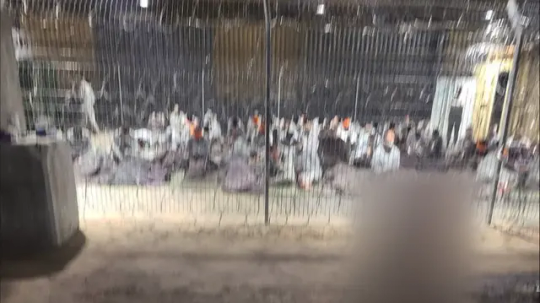
Strapped down, blindfolded, held in diapers: Israeli whistleblowers detail abuse of Palestinians in shadowy detention center..Finally, #CNN SPEAKS (May, 2024)
Sde Teiman: Israeli whistleblowers detail abuse of Palestinians in shadowy detention center | CNN
| تحقيق لسي إن إن: - انتهاكات وتعذيب لمعتقلين فلسطينيين على يد جنود إسرائيليين في مركز اعتقال سري بالنقب. - شهادات مخبرين إسرائيليين كشفت أن المعتقلين الفلسطينيين يعيشون ظروفا قاسية للغاية.
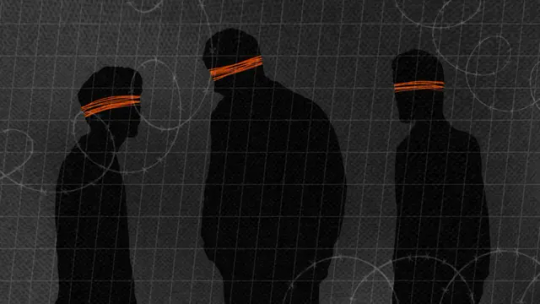
Update from #Khan Yunis (May, 2024) :
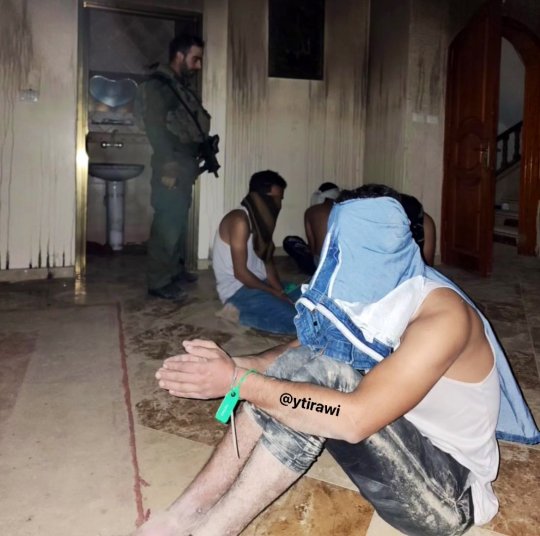
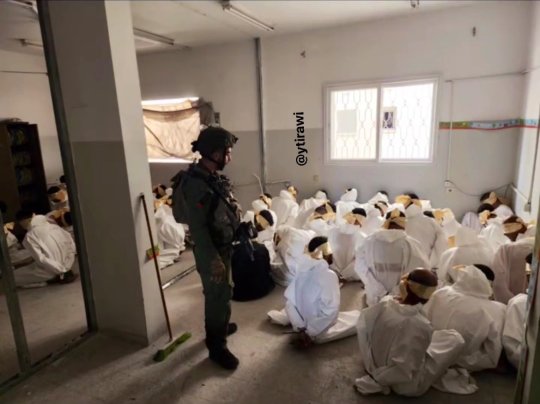
Palestinian citizens, who have been kidnapped by Israel's military from Khan Yunis | (Jan., 2024)
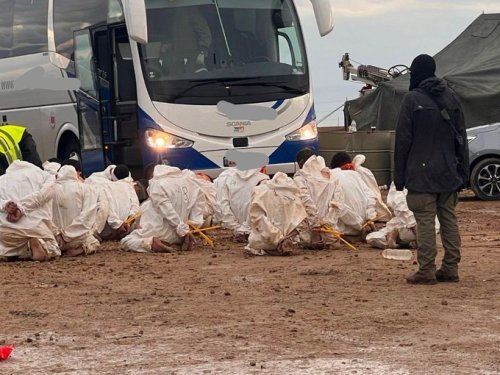
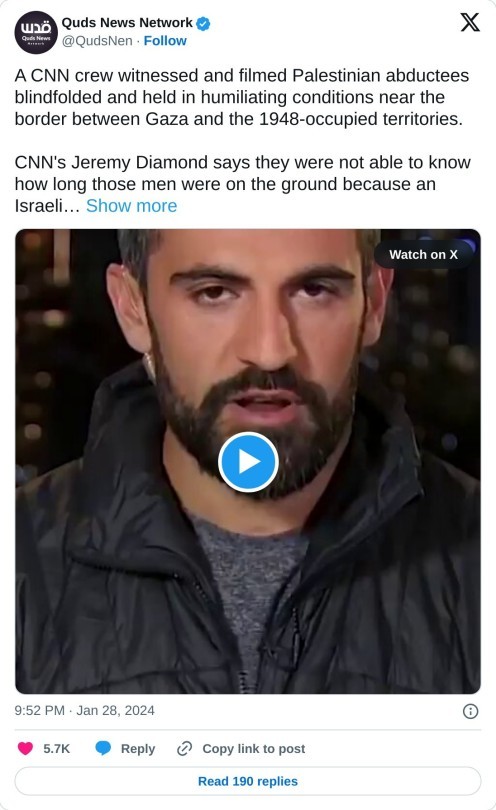
Palestinian men detained by Israeli forces since the start of the war in Gaza have told Middle East Eye how they were physically tortured with dogs and electricity, subjected to mock executions, and held in humiliating and degrading conditions. (March, 2024)
www.middleeasteye.net
long live the resistance : This is what Farouq looks like after severe... (tumblr.com) Dec, 2023
#ISRAEL#crimes against humanity#torture#amnesty international#genocide#gaza#palestine#journalism#free palestine#journal#investigative journalism#freedom#humanitarian#humanity#human rights#newspaper#world news#news on gaza#palestine news#wow#war crimes#guantanamo#abu ghraib#prisoners#prisoners of war#photographers on tumblr#rafah#CNN#breaking news#investigation
75 notes
·
View notes
Text
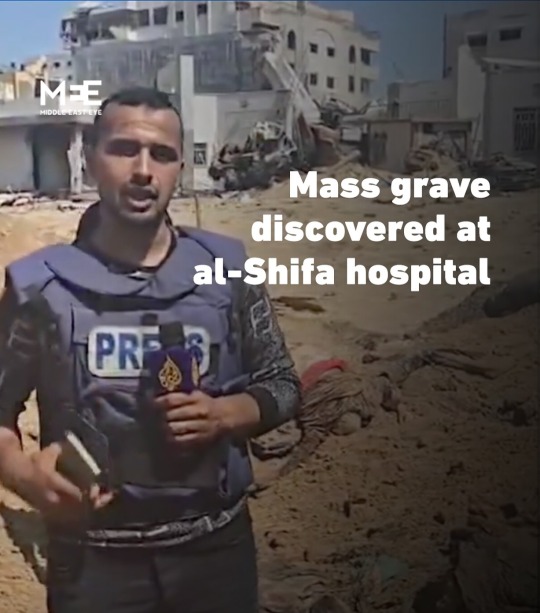

A mass grave was discovered at al-Shifa Medical Complex after a deadly Israeli assault last month left the Gaza City hospital in ruins.
Several bodies were found Monday in the hospital’s courtyard, including at least one person wearing underwear who appeared to have been “executed recently” according to an Al Jazeera Arabic reporter at the scene.
After Israeli forces withdrew from the hospital on 1 April, teams from several government ministries were deployed to al-Shifa to remove and identify bodies.
The searches were initiated after survivors said they witnessed the summary execution of Palestinians by Israeli forces during the two-week raid that started in mid-March.
x
#al-shifa medical complex#gaza city#mass grave#israeli assault#war crimes#human rights violations#gaza strip#international investigation#united nations#conflict aftermath#israeli-palestinian conflict#palestinian casualties#hospital bombing#civilian casualties#middle east conflict#international law#accountability#humanitarian crisis
57 notes
·
View notes
Text

Source - Smooth Dunk on twitter
#palestine#gaza#rafah#war crimes#war on gaza#rafah under attack#all eyes on rafah#children are dying#israel war crimes#icj#icj ruling#inability to self investigate#smooth dunk
35 notes
·
View notes
Text

So I saw this on a blog that has since been deleted.
Please share so everyone knows!
22 notes
·
View notes
Text
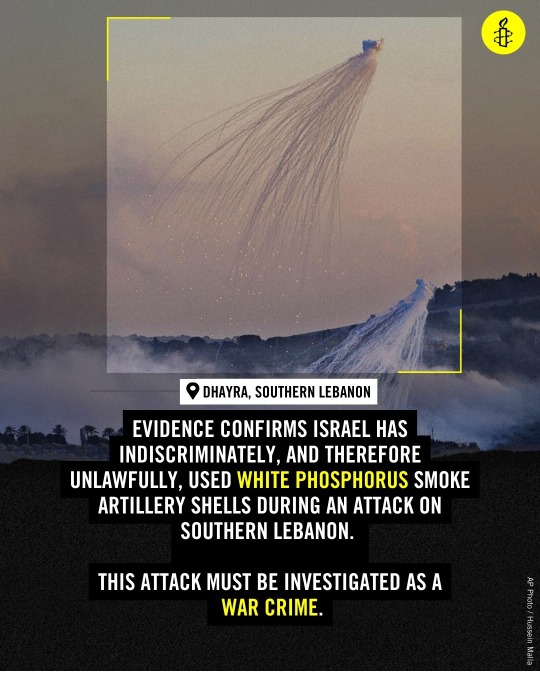
A new Amnesty investigation has found that the Israeli army indiscriminately, and therefore unlawfully, used white phosphorous in an attack on Dhayra in south Lebanon on 16 October.
The attack must be investigated as a war crime.
#israhell#war crimes#war criminals#white phosphorus#amnesty international#amnesty investigation#zionistterror#israel is a terrorist state#benjamin netanyahu is a war criminal#israeli occupation#stop israel#israeli war crimes#free palestine#free gaza#free west bank#palestinian lives matter#crime against humanity#stop the genocide#palestine#anti zionisim#colonization#palestine will be free#lebanon#israel is an apartheid state#israel is committing genocide#israel is the killer!
63 notes
·
View notes
Text
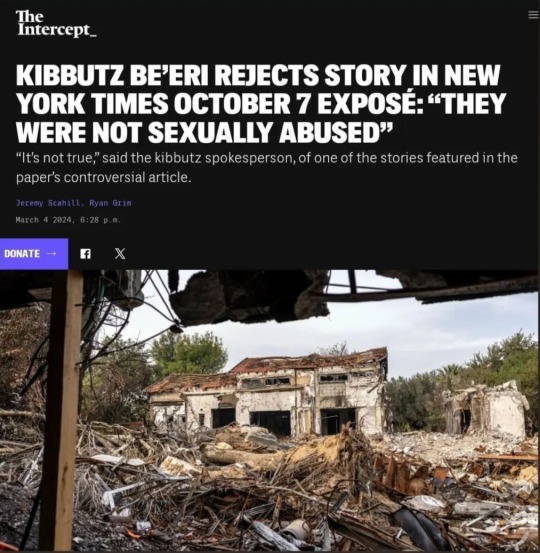
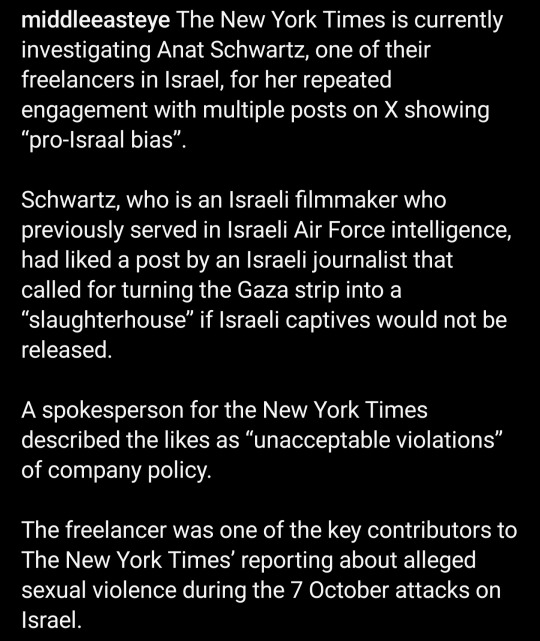
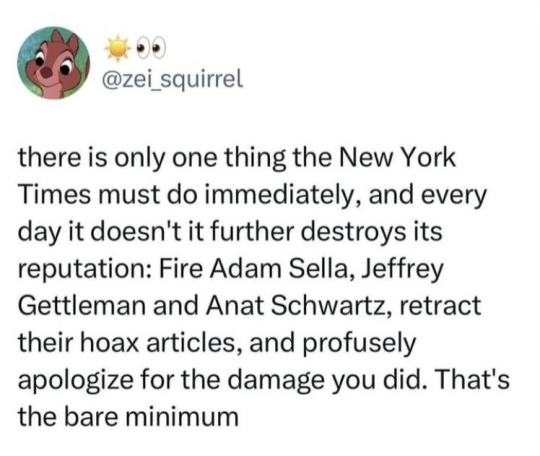
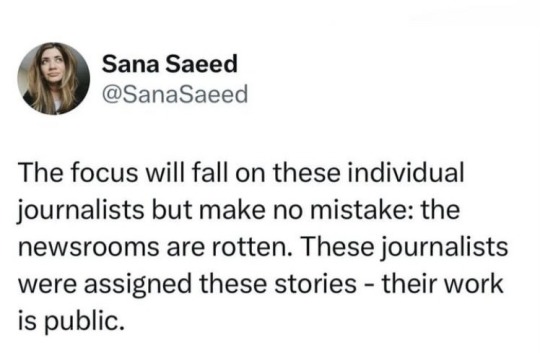
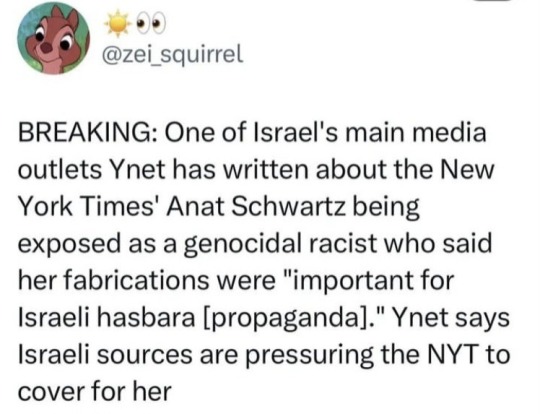
#new york times#yellow journalism#investigative journalism my ass#propaganda kills#israeli lies#ynet#anat schwartz#apartheid#save palestine#ethnic cleansing#israel is an apartheid state#seek truth#free palestine 🇵🇸#genocide#illegal occupation#israel is committing genocide#israeli war crimes#seek the truth and share it#all the lies spread about hamas supposedly doing the raping when its been the iof all along#spread awareness#adam sella#jeffrey gettleman#journalism is dead#Joseph goebbels would be oddly proud#zionism is nazism for the 21st century#just another way that the US is complicit in genocide and war crimes#israel is a genocidal state#genocidal liar#israeli propaganda#israel is a terrorist state
23 notes
·
View notes
Text

“Three Moments,” Vengeance of the Moon Knight (Vol. 2/2024), #8.
Writer: Jed Mackay; Penciler and Inker: Devmalya Pramanik; Colorist: Rachelle Rosenberg; Letterer: Cory Petit
#Marvel#Marvel comics#Marvel 616#Vengeance of the Moon Knight#Vengeance of the Moon Knight vol. 2#Vengeance of the Moon Knight 2024#Moon Knight comics#latest release#Moon Knight#Marc Spector#Soldier#/there’s/ the pragmatism hahaha#what a fascinating approach to crime fighting as opposed to the more common «every petty thief needs to be behind bars forever»#(wonder if Marc’s own belief that he’s perpetually just one ICC investigation away from being locked up for the war crimes he committed#informs this approach at all)#like yeah not ideal but it’s minimizing harm for the moment and who am I to judge too harshly *shrug*#this also makes me wonder though if the Midnight Mission is going to catch any heat for unleashing Khonshu#particularly from the Asgard side of things#(Midnight Mission v. Asgardians is actually something I’d like to see)
8 notes
·
View notes
Text
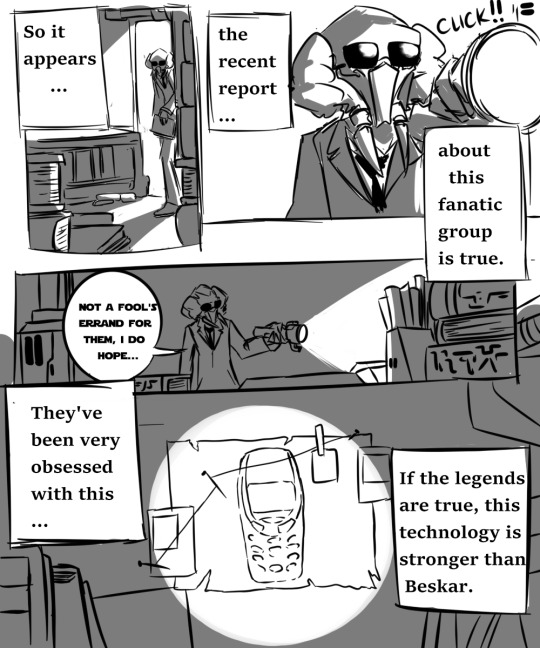
What have I done?
Commissions open :)
29 notes
·
View notes
Text
youtube
Israeli whistleblowers detail abuse of Palestinians in shadowy detention center
Strapped down, blindfolded, held in diapers: Israeli whistleblowers detail abuse of Palestinians in shadowy detention center
#palestine#free palestine#gaza#torture#crimes against humanity#detention#cnn#investigation#whistleblowers#israel is a terrorist state#israel is a war criminal#Youtube
7 notes
·
View notes
Text
A New Investigation confirms Israeli soldiers have permission to shoot and abuse civilians in Gaza
“They would gather the mattresses. They would gather the furniture that was left, and just set it on fire and go.”
Six soldiers shared testimonies with journalist @oren_ziv for +972 Magazine confirming Israeli forces are authorized to shoot Palestinian civilians, burn down their homes and loot their possessions.
Their testimonies corroborate months of eyewitness accounts and visual evidence showing likely war crimes committed by Israeli forces.
Israel is facing charges at the World Court for committing genocide in Gaza, in a case launched by South Africa in December.
But despite multiple independent investigations into Israel’s abuses in Gaza, the country’s allies, like the U.S., maintain that Israel should investigate itself for misconduct.
Over nine months, Israeli forces are confirmed to have killed around 40,000 Palestinians, including over 15,000 children. More than 87,000 Palestinians have been injured in the attacks, and over 17,000 children are without their parents.
Source: ajplus
#gaza genocide#free gaza#gaza strip#gazaunderattack#free palestine#fuck israel#israel is committing genocide#israel is a terrorist state#israel is a war criminal#israel is an illegal occupier#palestinians#west bank#war crimes#israel is an apartheid state#usa politics#politics#usa news#Investigation#Investigate#Abuse#Looting#Genocide#Gaza#ICJ#Trial#News#Army#Palestinian#united nations#war on gaza
4 notes
·
View notes
Text
Footage that seems to show fighters glorifying abuse of prisoners with ‘little fear of consequences’ could be used in war crimes prosecutions
Footage of rebel fighters in Sudan appearing to glorify the burning of homes and the torture of prisoners could be used by international courts to pursue war crime prosecutions, observers have told the Guardian.
Fighters from the Rapid Support Forces (RSF), a paramilitary group, have been accused of waging a campaign of ethnic cleansing in Sudan for the past year as they try to take control of the country.
As the RSF has overrun the western region of Darfur, fighters appear to have filmed and posted evidence of their actions on social media. Self-incriminating footage has been viewed by the Guardian and verified by the Centre for Information Resilience (CIR).
The footage could become evidence for war crimes investigators, say observers, after the international criminal court put out a call for submissions of visual and audio evidence from Darfur last year.
“It’s someone condemning themselves. It’s not the same as a guilty plea but in some ways, it is a big piece of the puzzle that war crimes investigators have to put together,” said Alexa Koenig, co-creator of the Berkeley Protocol, designed to create an international standard for using social media to investigate war crimes.
More than 10,000 people – mostly from the African Masalit ethnic community – died in the Darfur city of El Geneina during two periods of intense fighting in 2023. A UN investigation later discovered a mass grave of dozens of Masalit civilians allegedly killed by the RSF.
continue reading
4 notes
·
View notes
Text
Man, I'd missed DnD. My flatmate got a group together and we had our fourth session tonight and it feels like we're really properly getting into the swing of it and it's So much fun.
My character, Benjamin Larkwright, is a war wizard who was a magically-trained soldier as a young man and then a watchman for about a decade before quitting to take up his magic again and become an adventurer, and playing a mystery adventure as an ex-cop who keeps forgetting about his magic and solving problems like a detective is Really fun. I'm getting to mess around with all the crime drama tropes that I love while Also being a wizard, it's Great.
A couple of stand-out moments from this last session included getting to do the Hot Fuzz fence jumping thing, where the loxodon paladin just walked through the garden wall and Benjamin, on principle, vaulted a bit of still-intact wall aaand managed to roll an 8, land badly on his bad ankle and nearly faceplant in the street. The other wizard who, despite being a nerd and unathletic, is also 17 and limber managed to get over the wall with no trouble and got waved off from helping him up with a cranky "I've got a bad ankle, it's fine, I'm old, leave me alone." (He's like 45ish.)
We'd also earlier been to talk to the local sheriff about the epidemic of missing people we'd been hired to investigate (by his sister, it turned out, who thought he wasn't doing enough about it), and I got to play Benjamin going from marching in all judgemental and dragging this guy's curtains open in the face of his dreadful hangover and pointedly shifting the bottles off his desk to put down the list of missings we got from his sister, to leaving with a gentle word about hangover cures and all his missing person files and a promise to deal with whatever hold the villain has over him that he couldn't tell us about but had clearly caused an extended breakdown and is preventing him from investigating properly himself. (Kidnapped wife and son, we later worked out, who are among the people going missing around this Highly Suspicious Casino that appeared in town six months ago.)
The best moment, though was when I finally got to catch the other wizard out on the gems she stole from a bag in the mail car when we were searching the train to the town for Weird Shit. She'd managed to do it while the rest of the party were all out on the platform tidying up the mess from our fight with a gargoyle that had also been sent in the post via the train, so none of us had any reason to even suspect she'd nicked them. But then we were investigating a weird magical effect outside the temple we were in, and Abigail goes and pulls out these gems right in front of Benjamin's nose to see if they react to the magical field. He recognises them from before, asks her where she got them from, and she lies to his face that they were something she inherited from his wizard grandfather. So, two sessions after the theft, I finally get to insight check her, with my +5 insight vs her +0 deception, and I roll a 21. Which, upon realising that there's nothing she can roll to beat that, causes me, out of character, delighted, to exclaim "ha! Get insighted, crime child!"
Which was apparently the highlight of the session to the DM and everyone else and got me an inspiration as the culmination of a bunch of good ex-policeman roleplaying, which was delightful. (Got a good grade in DnD, which is both normal to want and possible to achieve.) The player of the other wizard now desperately wants me to draw a very pleased-with-himself Benjamin looming over a cowering Abigail pointing and exclaiming "Get insighted, Crime Child!", he was that amused by it, and honestly I might later when I'm less busy.
In-universe, Benjamin just gave her The Look, though, and said "alright, I'll believe you", with them both knowing Full Well that he doesn't. It was then followed up by him dashing (so Detect Magic didn't run out) over to the temple down the street to check if the magic field effect was also unable to penetrate the inside of that temple, and passing Abigail who tried to follow him on the way back, much slower on her "weak nerd legs" and pestering her into jogging the whole way back again while Benjamin made it very clear without outright saying that the jogging was her penance for the petty crime. (He's not a watchman anymore and he's not her dad so he's just going to mess with the kid in the hope that it makes her think twice the next time she gets the urge to be sticky-fingered with potentially dangerous magical items. And also for his own amusement, tbh.)
It was all very funny, I'm having a great time being the (metaphorical, he's aroace) straight guy to the rest of the party's hijinks and also occasionally indulging in my own. We ended the session thoroughly convinced that all roads lead to the Suspect Casino, having tugged on every investigative thread to Benjamin's satisfaction (and everyone else's), and he snapped his suspiciously-police-looking notebook shut and said "On that, Droozh, we are in complete agreement." to the loxodon paladin's declaration that he thinks now is Definitely the time to march into the casino and demand to know what the hell is going on. And yes, Droozh has wanted to do that since we arrived in town and the place seemed a bit sus from the whole 'got sent a gargoyle in the post' thing, but now we can march in and start cracking skulls in an Informed and Well Considered manner, having a better idea of what we're up against.
I love DnD, I've missed it.
#yes yes i know playing a policeman...#but i like investigator characters and it's part of a whole commentary thing with his character#on dehumanising jobs and how you Actually go about helping people#when you have power that they don't#being a watchman was a holding pattern job for benjamin after his whole life was destroyed by war#a continuation of the 'being a soldier is how you serve your country' thing his parents believed in#and choosing to quit and take up his magic again was the first positive choice he'd made in twenty years#but also he's a trained watchman who still cared about being good at his job#even though he was miserable the whole time and not admitting it to himself#so he still solves his problems as a policeman#if the campaign lasts long enough maybe he'll start learning how to be a wizard#but in the meantime i've watched too many crime dramas and i'm making that the dm's problem#by playing an extremely nosy bugger who writes everything down#(she knew i would be it's all good)#i didn't decide benjamin was a notebook guy ahead of time but he sure is now#cue a great many hot fuzz jokes which we're all leaning into#and i definitely have to draw something about eventually#dungeons and dragons#benjamin larkwright#personal stuff
4 notes
·
View notes
Text

youtube
#racism#race war#mass shooting plot#Mark Adams Prieto#FBI investigation#Atlanta#African American community#hate crime#firearms trafficking#unregistered firearm#racial violence#terrorism plot#2024 presidential election#federal indictment#law enforcement#gun shows#domestic terrorism#racial discrimination#white supremacy#racial hatred#Confederate flags#KKK slogans
7 notes
·
View notes
Text
A mission to achieve mind control : Project MK Ultra
Project Mk Ultra, an experiment started during the cold war to achieve mind control so that the US could interrogate Russian spies. The project was initiated by the CIA in 1953 and ended in 1973.
What was this project?
This project included the identification of drugs which could be used in interrogations to weaken individuals and brainwash them or as a form of psychological torture. This started after a period of paranoia at the CIA when America had lost it's nuclear monopoly and the fear of communism was high. Plus, the US was suspecting Russia that they were potentially using drugs to interrogate US soldiers.
What drugs were used?
Mainly the usage of LSD ( Lysergic acid diethylamide ) in high doses. There were also other forms of torture that were used which included isolation , electric shocks , etc.
MKUltra was preceded by Project Artichoke. It was organized through the CIA's Office of Scientific Intelligence and coordinated with the United States Army Biological Warfare Laboratories. The experiments took place in colleges, universities, hospitals, etc. The CIA operated using front organizations, although some top officials at these institutions were aware of the CIA's involvement.
Who were used as lab rats in this experiment?
Citizens from America and Canada. At first, the soldiers from the US Army were subjected to the experiment where LSD was administered to them. Plus, the drug was also administered to prostitutes, mental patients, prisoners, drug addicts, in short to all those "who couldn't fight back". The drug was also administered to CIA employees, military personnel, doctors, other government agents, in an effort for them to blurt out their deepest secrets or wipe a subject's mind clean, thus creating a robot agent. LSD and other drugs were often administered without the subject's knowledge or informed consent, a violation of the Nuremberg Code the U.S. had agreed to follow after World War II.
Who was the main scientist?
Dr. Sidney Gottlieb was the director of MKUltra. He convinced the CIA to buy the entire supply of LSD from Sandoz Laboratories in Basel, Switzerland for 240,000 dollars. That amounts to 4 million in 2024.
Where did the experiments take place?
In agency brothels set up in safehouses in San Francisco. They took a selection of men who would be too embarrassed to talk about the events. They were dosed with LSD and kept in rooms with one-way mirrors then interrogated under bright lights with doctors in the background taking notes. Sessions were recorded for later reviewing. The people under this interrogation were CIA employees, U.S. military personnel, and agents suspected of working for the other side in the Cold War. They were all threatened with being kept in those rooms for longer periods of time if they didn't reveal their secrets.
Were there any major casualties?
Yes. Frank Olson, a United States Army biochemist and weapons researcher fell to his death from a 13th floor hotel building in New York. He was administered LSD without his knowledge which led him to becoming worried about his well-being. He was sent to New York by the CIA to see a psychiatrist and then he was actually executed by the CIA because he was about to resign and divulge state secrets to the media. Thus becoming a security risk.
Revelations?
In 1973, amid a government-wide panic caused by Watergate, CIA Director Richard Helms ordered all MKUltra files destroyed. Pursuant to this order, most CIA documents regarding the project were destroyed, making a full investigation of MKUltra impossible.
In December 1974, The New York Times alleged that the CIA had conducted illegal domestic activities, including experiments on U.S. citizens, during the 1960s. That report prompted investigations by the United States Congress, in the form of the Church Committee, and by a commission known as the Rockefeller Commission that looked into the illegal domestic activities of the CIA, the FBI and intelligence-related agencies of the military.
In the summer of 1975, congressional Church Committee reports and the presidential Rockefeller Commission report revealed to the public for the first time that the CIA and the Department of Defense had conducted experiments on both unwitting and cognizant human subjects as part of an extensive program to find out how to influence and control human behavior through the use of psychoactive drugs such as LSD and mescaline and other chemical, biological, and psychological means. Also revealed the death of Frank Olson.
For more information you can check out the documentary on Netflix, revolving around the same subject= Wormwood.
#thriller#cia#united states of america#america#cold war#documentary#true story#netflix#crime thriller#crime investigation#true crime commentary#true crime blog#investigative journalism#journalism
4 notes
·
View notes